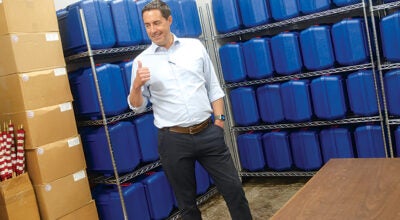Road salt and other de-icers can lead to expensive rust damage to vehicles
Published 12:00 am Saturday, January 22, 2022
Periodic car washing can help offset costly rust issues
Millions of Americans face expensive vehicle repairs from rust damage every year, and the chemicals used to de-ice roadways can be one of the main culprits. AAA East Central advises motorists to be proactive throughout the winter to prevent dangerous rust-related vehicle damage to brake lines, fuel tanks, exhaust systems and other critical vehicle components.
“Regularly washing your vehicle in the winter is critical to avoiding costly repairs down the road,” Mike Hoshaw, vice president of automotive services for AAA East Central, said. “Over time, rust can not only cause cosmetic issues, but serious safety issues if components on the underside of your vehicle become damaged.”
In recent years, many state and local transportation departments have shifted from using rock salt to liquid de-icers to combat ice and snow on the roadways. These newer alternatives are more effective than traditional salt because they can be applied before a snowstorm, have a lower freezing point and melt ice and snow faster. However, these same characteristics can be even more damaging to vehicles since the chemicals remain in liquid form longer, are more likely to coat components and seep into cracks and crevices where corrosion can accelerate.
While some rust damage is unavoidable, AAA East Central recommends motorists take the following preventative steps in order to reduce the possibility of vehicle damage:
• When possible, limit driving immediately before, during and after winter storms when salt and de-icing solutions are being applied and are at their highest concentrations.
• Frequently wash your vehicle, paying particular attention to the undercarriage. This will loosen, dissolve and neutralize road salts. Many drive-through car washes offer an undercarriage rinse as an option.
• Always use a high-quality car wash solution, not a household dish detergent that will strip the wax from your vehicle.
• Repair any body damage and touch up paint scratches and chips that expose bare metal which could lead to rust.
• Give the entire vehicle and undercarriage one last cleaning in the spring. Any deposits left over from winter can continue to cause corrosion year-round if not properly removed.
AAA strongly urges drivers who experience any of the following vehicle malfunctions to immediately move the vehicle off the road to a safe location and have it towed to a trusted AAA Approved repair facility:
• In-dash warning lights for brakes and other critical systems.
• A “spongey” or soft feeling when applying pressure to the brake pedal.
• An unusually loud exhaust sound or the smell of fumes in or around the vehicle.
• The prominent smell of gasoline or diesel fuel when the vehicle is running or parked.






